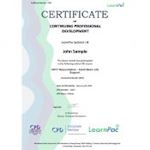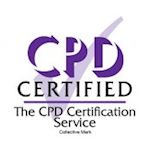CSTF Resuscitation – Adult Basic Life Support - Level 1 - Online Course - CPD Accredited
CPDUK Accredited | Instant Course Access | Includes Assessment & Certificate | Instant Certificate Download
LearnPac Systems
Summary
- Certificate of completion - Free
- Exam(s) / assessment(s) is included in price
- Tutor is available to students
Add to basket or enquire
Overview
CSTF Resuscitation – Adult Basic Life Support - Level 1 - Online Course - CPD Accredited.
Welcome to our online CSTF Resuscitation – Adult Basic Life Support – Level 1 training course.
Our online cardiopulmonary resuscitation (CPR) training courses are developed in line with the latest Resuscitation Council (UK) and meet the UK Core Skills Training Framework (CSTF). This CSTF Resuscitation – Adult Basic Life Support e-learning courses meet current UK legislation, as well as the requirements set out by the Care Quality Commission (CQC), Health and Safety Executive (HSE) and other professional and regulatory bodies.
Certificate duration: 2 years
Entry requirements: No entry restrictions
Recommended prerequisites: N/A
Assessment type: End of course assessment
Assessment pass mark – 80% needed to pass and gain a CPD certificate
Cost(s) of assessment and certification – All costs included in the course price
Awarding/Accrediting body – CPD Certification Service (CPDUK)
CSTF Resuscitation – Adult Basic Life Support - Level 1 - Online Course - CPD Accredited.
CPD
Course media
Description
Course aims
On completion of this online CSTF Resuscitation – Adult Basic Life Support training course, the learner will:
- Be able to recognise a cardiorespiratory arrest,
- Know how to summon immediate emergency help following local protocols, and
- Be ready to start CPR using chest compressions.
Learning outcomes
Learning outcomes are divided into three levels based on knowledge, skills and understanding. The appropriate level of training is dependent upon an individual’s role, work context and a local risk assessment.
The levels given here are for the majority of staff who might need to be involved in delivering CPR. However, there are additional specialist levels of outcomes which need to be achieved for those who are expected to lead a resuscitation team, are resuscitation team members or teach resuscitation. These specialist outcomes are not covered in this framework. For further information about specialist outcomes, please see the Resuscitation Council (2015) Resuscitation Guidelines and the Quality Standards for Clinical Practice and Training.
Where staff are exposed to and involved in the care of patients from a range of age groups, they should receive the relevant type of resuscitation training.
Level 1 resuscitation learning outcomes
- Any clinical or non-clinical staff, dependent upon local risk assessment or work context.
Level 2 resuscitation learning outcomes
Staff with direct clinical care responsibilities, including all qualified healthcare professionals:
- Staff working with Adult patients should undertake training in adult basic life support,
- Staff working with Paediatric patients should undertake training in paediatric basic life support, and
- Staff working with Newborn patients should undertake training in newborn basic life support.
Level 3 resuscitation learning outcomes
Staff with direct clinical care responsibilities, including all qualified healthcare professionals:
- Registered healthcare professionals with a responsibility to participate as part of the adult resuscitation team should undertake adult immediate life support training,
- Registered healthcare professionals with a responsibility to participate as part of the paediatric resuscitation team should undertake paediatric immediate life support training,
- Registered healthcare professionals with a responsibility to participate as part of the newborn resuscitation team should undertake newborn life support training,
- Registered healthcare professionals involved in administering rapid tranquillisation in the care of patients with disturbed mental functioning should undertake adult immediate life support training, and
- Registered healthcare professionals involved in administering sedation in the care of dental or podiatric patients should undertake adult immediate life support training and, where appropriate to caseload, paediatric immediate life support training.
Why is online resuscitation training essential?
It is a common expectation that healthcare staff will have sufficient knowledge and skills to be able to recognise and respond to signs of clinical deterioration. Where healthcare staff can anticipate, identify and respond to patient signs of clinical deterioration, they can prevent further decline that might otherwise culminate in cardio-respiratory arrest. Consequently, there has been a particular focus on promoting greater awareness and understanding of the needs and care of the deteriorating patient.
While the priority is on preventing clinical deterioration, some patients’ condition will progress to cardio respiratory arrest and require cardiopulmonary resuscitation (CPR). Early and effective resuscitation can save lives. Research in emergency care of collapsed people has led to significant advances in resuscitation techniques. Healthcare organisations must have a clearly defined resuscitation policy and ensure that they provide an effective resuscitation response and service.
As part of their duty to ensure safe and effective care, healthcare organisations must ensure that their workforce receives the appropriate training, including periodic updates, to maintain a level of resuscitation competence relevant to their role. The requirements stated are minimum standards and apply to the majority of the workforce in roles and settings where they might be required to provide initial CPR until the arrival of advanced life support expertise and support.
What is covered in this course?
This online CSTF Resuscitation – Adult Basic Life Support training course covers the following:
- Unit 1 – Introduction
- Definitions:
- What is cardiac arrest?
- What is a heart attack?
- What is cardiopulmonary resuscitation?
- Cardiac arrest or heart attack?
- What are the signs of a heart attack?
- What are the causes of cardiac arrest?
- Definitions:
- Unit 2 – Resuscitation Council UK guidance
- UK statistics
- Unit 3 – CPR and defibrillation
- Importance of CPR
- The Chain of Survival
- Automated External Defibrillators (AEDs)
- What is an AED?
- Why are AEDs important?
- How does an AED work?
- Who can use an AED?
- Safe use of AEDs
- High-quality CPR
- Performing CPR effectively
- Hands-only CPR
- Unit 4- CPR for laypeople and first aiders
- Lifesavers
- Practical CPR training
- Links in the Chain of Survival
- Early recognition and calling for help
- Early CPR
- Early defibrillation
- Post resuscitation care
- Performing CPR
- Calling for help
- Giving information
- Chest compressions
- Rescue breaths
- Hands-only CPR
- Assisting a choking victim.
CSTF Resuscitation – Adult Basic Life Support - Level 1 - Online Course - CPD Accredited.
Who is this course for?
Who is the course for?
This online CSTF Resuscitation – Adult Basic Life Support training course is suitable for any clinical or non-clinical staff, dependent upon local risk assessment or work context.
CSTF Resuscitation – Adult Basic Life Support - Level 1 - Online Course - CPD Accredited.
Requirements
Learn anywhere, anytime on any device.
You will need access to a desktop computer, laptop, tablet or smartphone device to complete these online courses. You can start, pause/stop and return to where you left off.
Our courses utilise responsive design features, making them available on any device of your choice.
CSTF Resuscitation – Adult Basic Life Support - Level 1 - Online Course - CPD Accredited.
Career path
Our online courses and programmes range from introductory modules at Level 1 (awareness/beginner) to advanced and expert modules up to Level 6.
Our e-learning modules count towards CPD hours for professionals in various sectors as well as meeting mandatory and statutory requirements (where relevant).
CSTF Resuscitation – Adult Basic Life Support - Level 1 - Online Course - CPD Accredited.
Questions and answers
Currently there are no Q&As for this course. Be the first to ask a question.
Certificates
Certificate of completion
Digital certificate - Included
Reviews
Currently there are no reviews for this course. Be the first to leave a review.
Legal information
This course is advertised on reed.co.uk by the Course Provider, whose terms and conditions apply. Purchases are made directly from the Course Provider, and as such, content and materials are supplied by the Course Provider directly. Reed is acting as agent and not reseller in relation to this course. Reed's only responsibility is to facilitate your payment for the course. It is your responsibility to review and agree to the Course Provider's terms and conditions and satisfy yourself as to the suitability of the course you intend to purchase. Reed will not have any responsibility for the content of the course and/or associated materials.





